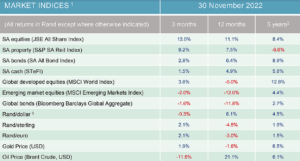Skip to content
Economic and Market Overview – December 2022
Economic and Market Overview
December 2022
November In Review
-
An advisory panel established by SA’s parliament found there are grounds for lawmakers to investigate President Cyril Ramaphosa in connection with a scandal over a robbery at his game farm. “In light of all the information placed before the panel, we conclude that this information discloses, prima facie, that the president may have committed” violations of sections of the constitution, it said in the report published at the end of November. President Ramaphosa has called on the Constitutional Court to dismiss the report.
-
South Africa’s central bank delivered another substantial interest-rate increase, prolonging its most aggressive monetary policy tightening cycle in at least two decades as it tries to tame inflation. The monetary policy committee raised the benchmark rate to 7% from 6.25%, and the prime rate from 9.75% to 10.5%.
-
Eskom restated the company’s reported loss for the 2021 financial year to R25.3bn, its fourth straight deficit. It also continues to struggle with maintenance and emergency repairs which has lead to stage 6 load shedding early in December.
-
US house prices have fallen 2% over the past two months but are still up more than 13% over the past year. In total, house prices have risen by an incredible 41% since the end of 2019. The most recent decline in house prices (August 2022) is extremely broad, with all 20 major cities surveyed recording a month-on-month fall-off in prices. House prices are expected to weaken significantly further in 2023, negating the housing bubble that emerged in 2020/2021. Hopefully, this rebalancing of the housing market will remain orderly.
-
China has lifted its most severe Covid policies – including forcing people into quarantine camps – following landmark protests against the strict controls. People with Covid can now isolate at home rather than in state facilities if they have mild or no symptoms. They also no longer need to show tests for most venues and can travel more freely inside the country.
-
Global GDP growth is expected to slow to 1.2% next year according to the Institute of International Finance, the same as in 2009. The slowdown will be led by Europe.
-
European Central Bank policymaker Mario Centeno said the ECB should slow the pace of interest rate hikes from December and sent a clear message that moves of 0.75% are not the norm as inflation is likely to peak this quarter. He does not believe that inflation is entrenched, nor that there are any second-round effects from wage increases, which have been well below inflation so far.
-
In the United States, Atlanta Fed President Raphael Bostic said he is ready to “move away” from 0.75% rate hikes at the December meeting and feels the Fed’s target policy rate needs to rise no more than another percentage point to tackle inflation. “If the economy proceeds as I expect, I believe that 0.75% to 1% basis points of additional tightening will be warranted”. “I believe this level of the policy rate will be sufficient to rein in inflation over a reasonable time horizon”. That would set the policy rate at a range of 4.75% – 5%.
-
Lastly, the South African president completed a two-day state visit to the UK, the first since King Charles took the throne, with the Conservative government eager to focus on trade rather than challenge South Africa’s refusal to impose sanctions on Russia over the invasion of Ukraine.
-
On a different note, Germany and Belgium both failed to make it past the group stage of the FIFA World Cup in Qatar, while Saudi Arabia (ranked 51st in the world) beat Argentina (ranked 3rd) 2-1.

- Source: Factset
- All performance numbers in excess of 12 months are annualised
- A negative number means fewer rands are being paid per US dollar, so it implies a strengthening of the rand.
Page load link

